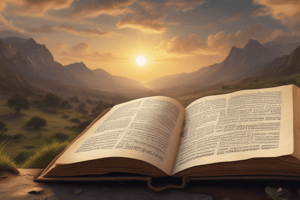Podcast
Questions and Answers
What primary themes do Psalms express?
What primary themes do Psalms express?
- Nature and geography
- Historical events and figures
- Philosophy and ethics
- Praise, lament, thanksgiving, and wisdom (correct)
Which type of Psalm is characterized by expressions of sorrow?
Which type of Psalm is characterized by expressions of sorrow?
- Hymns
- Lamentations (correct)
- Thanksgiving
- Wisdom Psalms
How many Psalms are found in the Hebrew Bible?
How many Psalms are found in the Hebrew Bible?
- 150 (correct)
- 100
- 120
- 200
Which literary feature is commonly used in Psalms?
Which literary feature is commonly used in Psalms?
Which is an example of a Wisdom Psalm?
Which is an example of a Wisdom Psalm?
Which individuals are traditionally attributed as authors of the Psalms?
Which individuals are traditionally attributed as authors of the Psalms?
What role do Psalms typically play in worship?
What role do Psalms typically play in worship?
Which of these Psalms is considered a Messianic Psalm?
Which of these Psalms is considered a Messianic Psalm?
Flashcards are hidden until you start studying
Study Notes
Psaims Overview
- Definition: Psalms are sacred songs or hymns found in the Bible, primarily in the Book of Psalms.
- Cultural Significance: Integral to Jewish and Christian worship traditions.
- Content Variety: Psalms express a range of emotions and themes including praise, lament, thanksgiving, and wisdom.
Structure
- Total Number: 150 Psalms in the Hebrew Bible.
- Types:
- Hymns: Songs of praise (e.g., Psalms 8, 19).
- Lamentations: Expressions of sorrow (e.g., Psalms 22, 42).
- Thanksgiving: Gratitude for God’s deliverance (e.g., Psalms 30, 107).
- Wisdom Psalms: Teachings and reflections on life (e.g., Psalms 1, 37).
Authorship
- Tradition: Traditionally attributed to figures like David, Asaph, Solomon, and others, though many are anonymous.
- Historical Context: Reflects the experiences of the Israelites throughout various periods, including exile and restoration.
Literary Features
- Parallelism: A common poetic device where ideas are repeated or contrasted in successive lines.
- Imagery: Rich use of metaphors and similes to convey themes (e.g., "The Lord is my shepherd").
- Structure: Often organized into stanzas or sections with refrains.
Use in Worship
- Liturgical Role: Frequently used in religious services, prayers, and personal devotion.
- Music: Many Psalms have been set to music and are sung in various traditions.
Interpretation
- Theological Insights: Provide insights into God’s nature, human suffering, and the relationship between God and humanity.
- Messianic Psalms: Certain Psalms are viewed as prophetic, foreshadowing the Messiah (e.g., Psalms 2, 22).
Modern Relevance
- Personal Reflection: Used for meditation and personal prayer.
- Cultural Impact: Influences literature, art, and music throughout history.
Psalms Overview
- Psalms are sacred songs or hymns located in the Bible, prominently featured in the Book of Psalms.
- Hold significant cultural importance within Jewish and Christian worship practices.
- Cover diverse emotions and themes such as praise, lament, thanksgiving, and wisdom.
Structure
- The Book of Psalms contains a total of 150 individual Psalms in the Hebrew Bible.
- Includes various types of Psalms:
- Hymns: Songs that celebrate and praise God (e.g., Psalms 8, 19).
- Lamentations: Expressions of sorrow and mourning (e.g., Psalms 22, 42).
- Thanksgiving: Psalms that convey gratitude for divine deliverance (e.g., Psalms 30, 107).
- Wisdom Psalms: Offer teachings and reflections on ethical living and life's purpose (e.g., Psalms 1, 37).
Authorship
- Traditionally attributed to prominent figures such as David, Asaph, and Solomon, though many authors remain anonymous.
- Reflect the historical experiences of the Israelites, encapsulating their trials during moments like exile and restoration.
Literary Features
- Utilizes parallelism as a poetic device, enhancing meaning through repetition or contrast in adjacent lines.
- Rich imagery is woven throughout, employing metaphors and similes to deepen thematic expression (e.g., "The Lord is my shepherd").
- Often structured with stanzas or sections, frequently using refrains to emphasize key ideas.
Use in Worship
- Psalms play a vital role in liturgy, forming a core component of religious services, prayers, and personal devotions.
- A significant number of Psalms are adapted into musical compositions, sung across various worship traditions.
Interpretation
- Provide theological insights into God's character, human suffering, and the dynamics of the relationship between humanity and divinity.
- Certain Psalms, referred to as Messianic Psalms, are seen as prophetic, hinting at the coming of the Messiah (e.g., Psalms 2, 22).
Modern Relevance
- Used for personal reflection, meditation, and enhancing individual prayer practices.
- Continues to influence various art forms, literature, and music throughout history, underscoring its lasting impact.
Studying That Suits You
Use AI to generate personalized quizzes and flashcards to suit your learning preferences.




